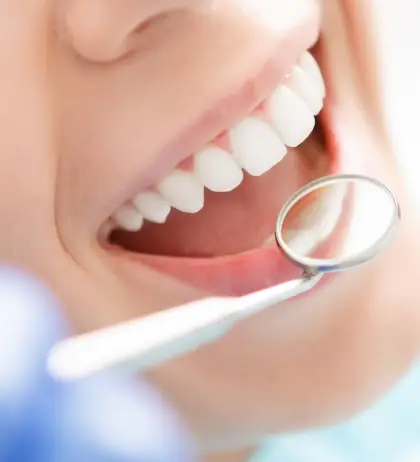General




Overcoming Dental Anxiety with Compassionate Care
Dental anxiety can mean different things to different people. For some, it may be triggered by the sounds and smells of a dental practice, bringing back memories of past experiences. For others, it may be the fear of discomfort during treatment.
At Woodhall Dental Practice, we understand these concerns and are committed to providing a comfortable, stress-free experience. Through a combination of gentle care, patience, and a reassuring approach, we strive to make dental visits a positive and routine part of your oral health journey. Our team is here to support you every step of the way, ensuring that your treatment is as pleasant and worry-free as possible.
The Role of Nutrition in Maintaining Optimal Oral Health
A well-balanced diet is essential for overall well-being, including strong teeth and healthy gums. Certain nutrients, particularly calcium and vitamin C, play a vital role in maintaining oral health. Ensuring these vitamins are part of your daily diet can help strengthen teeth and support gum health.
Your oral health starts with you! By maintaining a nutrient-rich diet and following a proper dental care routine, you can keep your teeth and gums healthy for years to come. If you have any concerns or need personalized advice, don’t hesitate to speak with your dentist.

Key Nutrients for Oral Health
- Calcium: Essential for strong teeth and bones, calcium helps maintain tooth structure. Dairy products such as milk, yogurt, and cheese are excellent sources. Many healthcare professionals recommend 1,200–1,500 mg of calcium daily for adults. If you do not consume dairy regularly, a calcium supplement may be beneficial. Additionally, choosing low-sugar or sugar-free yogurt can help minimize the risk of tooth decay.
- Vitamin C: This powerful antioxidant supports collagen production, which is essential for healthy gums. Excellent sources of vitamin C include citrus fruits (oranges, berries, and cantaloupe) as well as leafy greens like broccoli and spinach.
Essential Daily Oral Care Routine
In addition to a nutritious diet, a consistent oral hygiene routine is crucial for maintaining a healthy mouth. Follow these simple steps:
- Brush twice daily for two minutes using fluoride toothpaste.
- Use a small to medium-sized toothbrush with soft to medium multi-tufted, round-ended nylon bristles.
- Brush with small circular motions to ensure thorough cleaning.
- Replace your toothbrush every three months or sooner if the bristles become worn.
- Clean between your teeth daily using interdental brushes, floss, or dental tape.
- Limit sugary foods and drinks to reduce the risk of tooth decay.
- Visit your dentist regularly for check-ups and professional cleanings.
Frequently Asked Dental Questions
It is generally recommended to visit the dentist every six months for a routine check-up and cleaning. However, some individuals may require more frequent visits depending on their oral health needs.
Brush your teeth twice a day for two minutes using a fluoride toothpaste. Use a soft-bristled toothbrush and gentle, circular motions to clean all surfaces of your teeth, including the gumline. Don’t forget to brush your tongue to remove bacteria and freshen breath.
To prevent cavities:
- Brush and floss daily.
- Limit sugary and acidic foods and drinks.
- Use fluoride toothpaste and consider a fluoride mouthwash.
- Visit your dentist regularly for cleanings and check-ups.
Bad breath (halitosis) can be caused by poor oral hygiene, gum disease, dry mouth, or certain foods. To prevent it:
- Brush and floss daily.
- Stay hydrated and chew sugar-free gum to stimulate saliva flow.
- Clean your tongue using a tongue scraper or toothbrush.
- Visit your dentist if bad breath persists, as it may indicate an underlying issue.
Electric toothbrushes can be more effective at removing plaque, especially for people with limited mobility or orthodontic appliances. However, proper brushing technique is more important than the type of toothbrush you use.
For whiter teeth:
- Practice good oral hygiene to prevent stains.
- Avoid coffee, tea, red wine, and tobacco.
- Use a whitening toothpaste or professional whitening treatment, such as Enlighten Teeth Whitening, for long-lasting results.
- Consult your dentist before trying any whitening products.
If you have a toothache:
- Rinse your mouth with warm saltwater.
- Take over-the-counter pain relief if needed.
- Avoid chewing on the affected side.
- See your dentist as soon as possible, as pain can indicate infection, decay, or other issues requiring treatment.
To prevent gum disease:
- Brush and floss daily.
- Use an antibacterial mouthwash.
- Avoid smoking, which increases gum disease risk.
- Have regular dental check-ups to detect early signs of gum issues.
- Handle the tooth by the crown, not the root.
- Rinse it gently with water if dirty, but do not scrub it.
- Try to place it back in the socket if possible. If not, store it in milk or saliva.
- Seek emergency dental care immediately—the sooner a knocked-out tooth is treated, the better the chances of saving it.
Yes! Flossing removes plaque and food particles between teeth that a toothbrush cannot reach. This helps prevent cavities and gum disease. Daily flossing is just as important as brushing for maintaining good oral health.
Yes, gum disease (periodontal disease) can potentially affect your unborn baby. Research has shown that pregnant women with gum disease may have a higher risk of complications such as:
- Preterm Birth - Gum disease has been linked to an increased risk of delivering prematurely (before 37 weeks), which can lead to low birth weight and health issues for the baby.
- Low Birth Weight – Babies born with a lower birth weight may face developmental and health challenges.
- Preeclampsia – Some studies suggest a possible link between gum disease and preeclampsia, a condition that causes high blood pressure during pregnancy.
- Bacteria Transmission – Harmful bacteria from infected gums can enter the bloodstream, potentially reaching the placenta and affecting the baby’s development.
To reduce these risks, maintain good oral hygiene, visit your dentist regularly, and seek treatment for any gum issues. Let your dentist know you're pregnant, as some dental treatments may need adjustments.
Diabetes can have a significant impact on your dental health by increasing the risk of several oral health problems, including:
- Gum Disease (Periodontitis) - High blood sugar levels can make you more prone to infections, including gum disease. Diabetes reduces the body's ability to fight bacteria, leading to swollen, bleeding gums and, in severe cases, tooth loss.
- Dry Mouth (Xerostomia) – Diabetes can reduce saliva production, causing dry mouth, which increases the risk of cavities, bad breath, and oral infections.
- Slow Healing – High blood sugar levels can slow down healing after dental procedures, making infections and complications more likely.
- Thrush (Oral Fungal Infections) – People with diabetes are more susceptible to fungal infections like oral thrush (Candida), which causes white patches, soreness, and discomfort.
- Tooth Decay – High glucose levels in saliva can feed harmful bacteria, increasing the risk of cavities.
How to Protect Your Oral Health:
- Control Blood Sugar Levels - Keeping diabetes under control can help prevent oral complications.
- Practice Good Oral Hygiene – Brush twice daily, floss, and use an antibacterial mouthwash.
- Visit the Dentist Regularly – Get professional cleanings and checkups to catch issues early.
- Stay Hydrated – Drink water to combat dry mouth and reduce bacterial growth.
- Avoid Smoking – Smoking worsens gum disease and slows healing.
Managing your diabetes well can significantly reduce the risk of dental problems.
There is a strong link between gum disease (periodontitis) and strokes, primarily due to inflammation and bacterial infections that affect both oral and cardiovascular health. Here’s how gum disease may contribute to stroke risk:
- Increased Inflammation & Blood Vessel Damage - Gum disease triggers chronic inflammation, which can contribute to the hardening and narrowing of arteries (atherosclerosis). This increases the risk of blood clots, which can lead to a stroke.
- Bacteria Entering the Bloodstream – Oral bacteria from infected gums can enter the bloodstream and travel to the brain. These bacteria can contribute to plaque buildup in blood vessels, increasing the likelihood of a blockage that causes a stroke.
- Higher Risk of Ischemic Stroke – Studies suggest that individuals with severe gum disease have a higher risk of ischemic stroke, which occurs when a blood clot blocks oxygen flow to the brain.
- Impact on Blood Pressure & Heart Health – Gum disease has been linked to high blood pressure and heart disease, both of which are major risk factors for stroke.
Protecting Yourself from Stroke Risk
- Maintain good oral hygiene (brushing, flossing, and using mouthwash).
- Get regular dental checkups and professional cleanings.
- Manage risk factors like high blood pressure, diabetes, and high cholesterol.
- Adopt a healthy diet rich in fruits, vegetables, and whole grains.
- Avoid smoking, which worsens gum disease and stroke risk.
If you have a history of stroke or cardiovascular issues, keeping your gums healthy is especially important. Would you like specific tips on improving your gum health?
The health of your mouth and your heart are closely connected, primarily due to inflammation and bacteria that can spread from your gums to your bloodstream, affecting your cardiovascular system. Here’s how poor oral health can impact your heart:
- Increased Risk of Heart Disease Gum disease (periodontitis) causes chronic inflammation, which has been linked to a higher risk of heart disease. Inflammation can lead to narrowed arteries (atherosclerosis), increasing the risk of heart attacks.
- Bacteria Entering the Bloodstream Harmful bacteria from infected gums can enter your bloodstream, travel to the heart, and contribute to the formation of plaque in the arteries, which can restrict blood flow and increase heart disease risk.
- Higher Risk of Endocarditis Poor oral health can lead to bacterial endocarditis, a serious infection of the heart’s inner lining or valves. This occurs when bacteria from the mouth enter the bloodstream and attach to damaged heart tissue.
- Link to High Blood Pressure & Stroke Gum disease has been associated with high blood pressure and an increased risk of stroke. Inflamed blood vessels and plaque buildup can make it harder for the heart to pump blood efficiently. Keeping your mouth healthy can help protect your heart.
Smoking has a major negative impact on your gums and teeth, leading to serious oral health problems. Here’s how it affects your mouth:
- Increases Risk of Gum Disease (Periodontitis) - Smoking weakens your immune system, making it harder for your body to fight infections, including gum disease. Smokers are twice as likely to develop gum disease, which can lead to tooth loss if untreated.
- Slows Healing After Dental Procedures - Nicotine restricts blood flow, reducing oxygen and nutrients needed for healing. This means smokers take longer to recover from gum treatments, tooth extractions, or dental surgeries.
- Causes Bad Breath & Stained Teeth - Tobacco stains teeth yellow or brown and leads to chronic bad breath (halitosis). The chemicals in cigarettes stick to the tongue, gums, and teeth, causing persistent odor.
- Increases Risk of Oral Cancer - Smoking is one of the leading causes of oral cancer, affecting the lips, tongue, cheeks, and throat. Smokers are six times more likely to develop oral cancer than non-smokers.
- Reduces Saliva Production (Dry Mouth) - Smoking contributes to dry mouth, increasing the risk of cavities, infections, and bad breath since saliva helps wash away bacteria.
- Weakens Tooth Enamel & Increases Decay - Tobacco use can wear down tooth enamel, making teeth more prone to decay and sensitivity.
